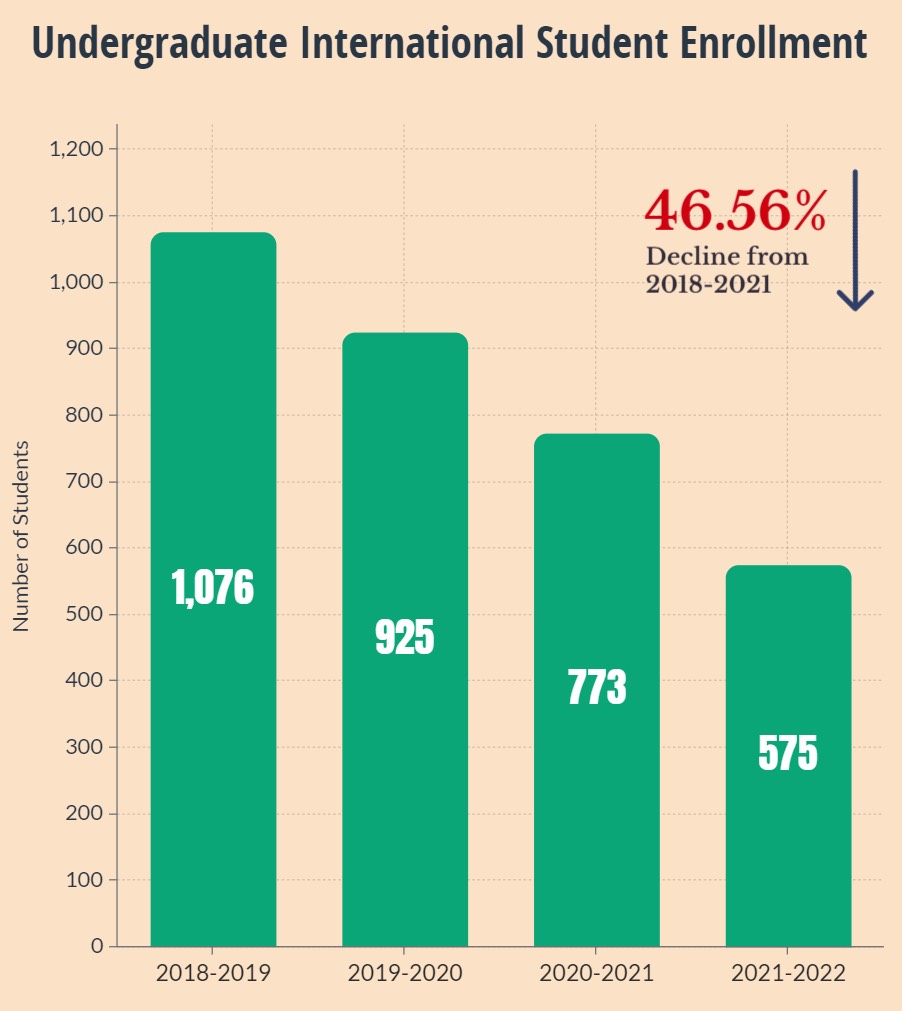International student applications have increased this year after a significant decrease during the COVID-19 pandemic.
In a March 29 Student Association (SA) Congress meeting, Binghamton University President Harvey Stenger said there was a 17 percent increase in international student applications since last year. The increase came after international student enrollment decreased by almost half over the past three years.
The cause of this decrease is multifaceted, ranging from COVID-19 restrictions to increased xenophobia in politics, according to Stenger and Donald Nieman, executive vice president for academic affairs and provost. The pandemic made it difficult for travel arrangements to be made and for visas to be obtained, inhibiting the ability of international students to come to the United States. As fewer international students applied to and enrolled at BU, and the students who enrolled pre-pandemic graduated, the number of international students enrolled at the University declined.
“[In fall 2021] the number of new international graduate students was approximately 70 percent of the number who enrolled in fall 2019, before the pandemic,” Stenger and Nieman wrote in an email. “Unfortunately, the large cohort of international master’s students who enrolled in fall 2019, graduated. So, with a small class enrolling in fall 2020 and a smaller class entering in fall 2021, the overall number of international graduate students remained far smaller than in fall 2021.”
In tandem with the problems posed by the pandemic, Stenger and Nieman said an increase in expressions of xenophobia in the United States has contributed to a lower number of international student applications.
“The image of the [United States] has still not recovered from the anti-immigrant sentiment expressed in the 2016 presidential election and policies that were enacted thereafter,” Stenger and Nieman wrote. “Many international students feared that they would not be safe coming to the [United States] to study, and they began looking to other countries, notably Canada and Australia.”
Xi Li, an international student from China and senior majoring in mathematics, suggested that many Asian students do not feel safe coming to the United States due to the anti-Asian sentiment that has been expressed during the pandemic.
“With Donald Trump’s ‘Chinese virus’ propaganda, hatred toward Asians [has] risen,” Li wrote in an email. “There were many cases [where] Asians were attacked with malice, no matter U.S. citizenship or not. Future international students feel [it is] risky to go to colleges whose security conditions are bad. For this problem, [BU] has done well in securing the campus. What they can do is to convince the future international students that [BU] and [the] surrounding area are safe, [that] there’s no need to worry [about] being attacked in Binghamton.”
According to Stenger and Nieman, the changing relationship between the United States and China has also contributed to changes in the number of international students enrolled at BU.
“This has produced a sharp decline in applications from Chinese students, especially for U.S. graduate programs,” Stenger and Nieman wrote. “The U.S. government has established restrictions on the ability of most [science, technology, engineering and mathematics (STEM)] programs to bring Chinese students into their labs, and Chinese students increasingly find highly attractive graduate study options at home.”
In order to remove these obstacles to international student enrollment, Stenger and Nieman said the University has altered its programs for international students. As a part of this, the University created virtual programs for first-year international students, also partnering with a university in Beijing, China to create an “abroad at home program” to allow Chinese students to take courses in Beijing while receiving BU credit.
While the University has been taking steps to attract international students to BU, many of the obstacles that international students face occur after they enroll, according to Shaarang Sawale, an international student from India and freshman majoring in computer science. Sawale said many of the obstacles he has faced as an international student have been administrative or logistical.
“For every administrative procedure for someone from here, there’s [five] more for an international student,” Sawale wrote. “I think with the right introductions to procedures like opening a bank account, getting a job, getting a [social security number], filing taxes with the [Internal Revenue Service] and many other ones, an international student’s experience at the University can be improved.”



